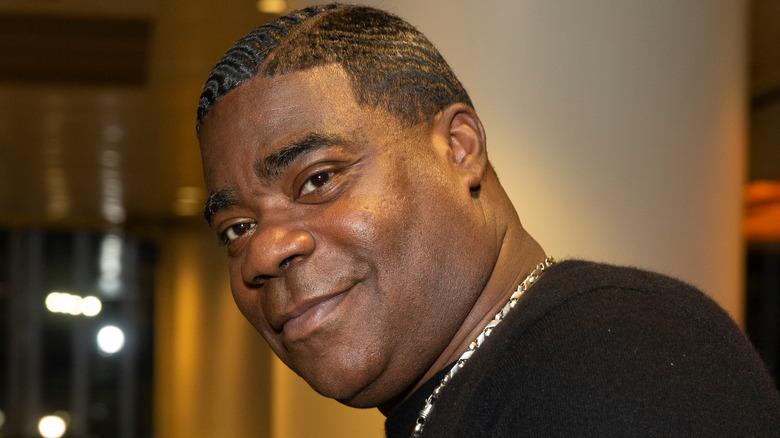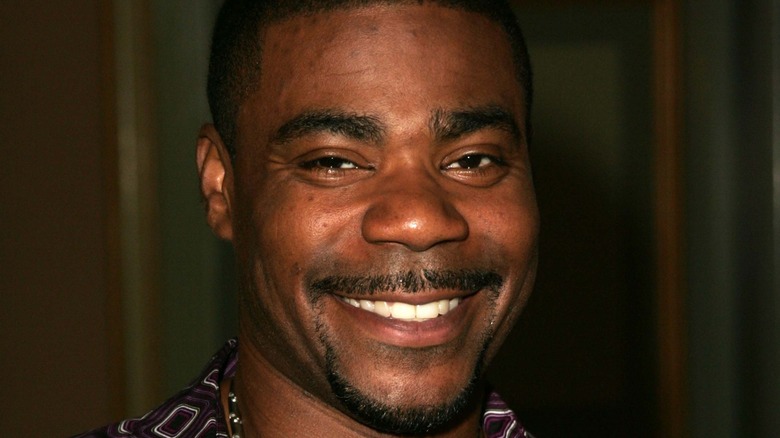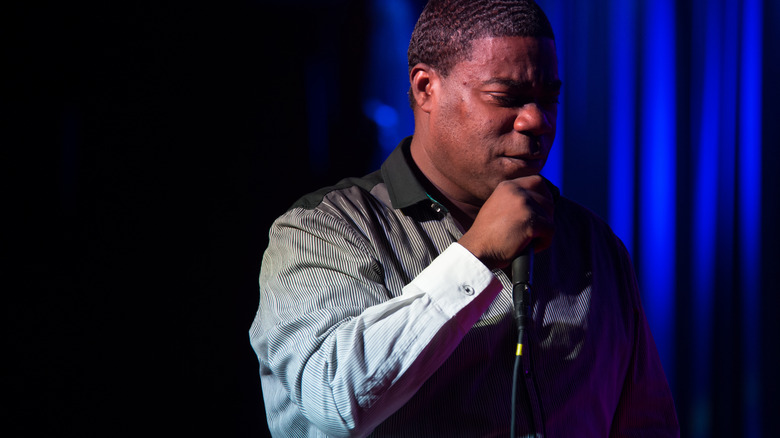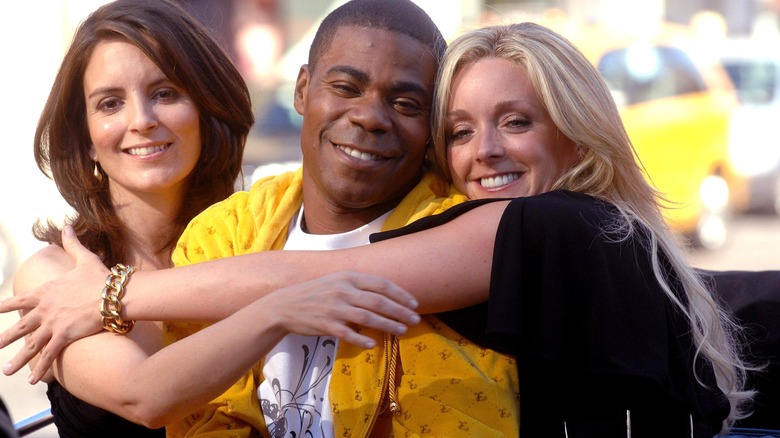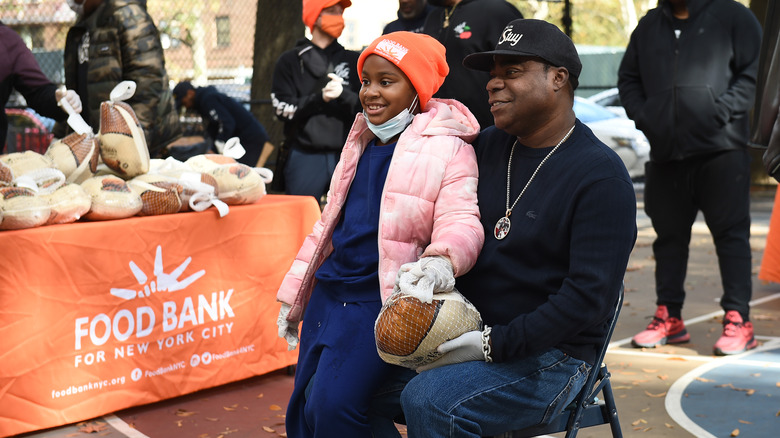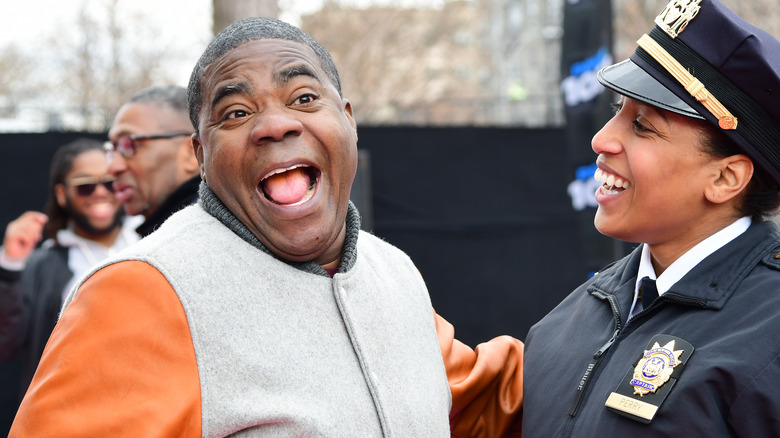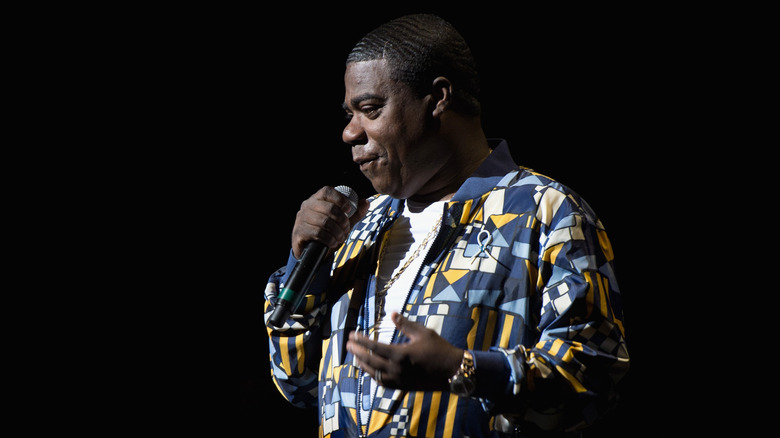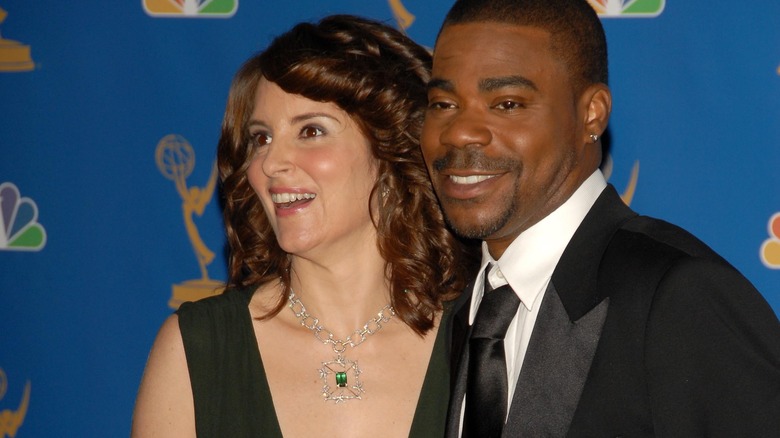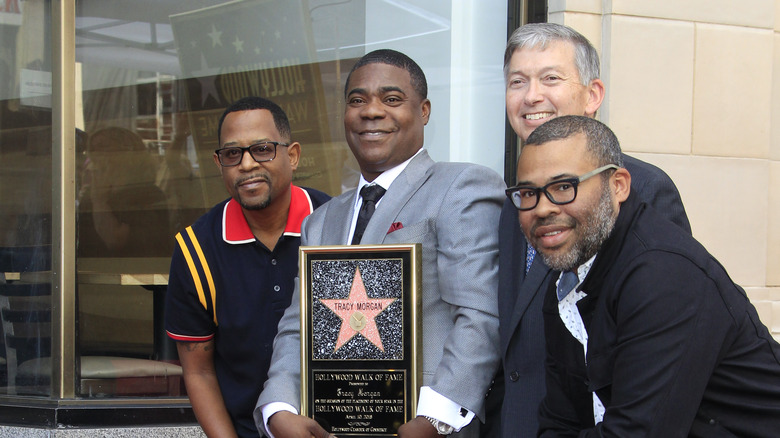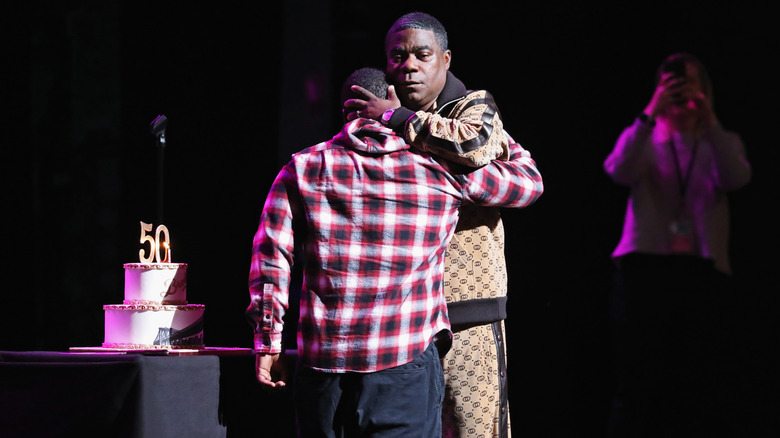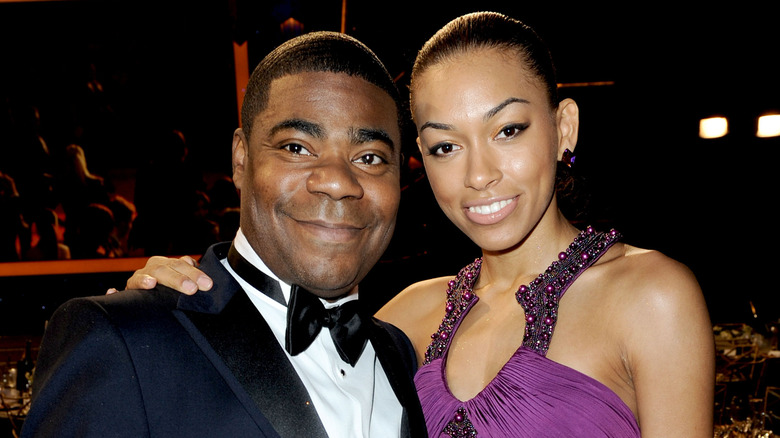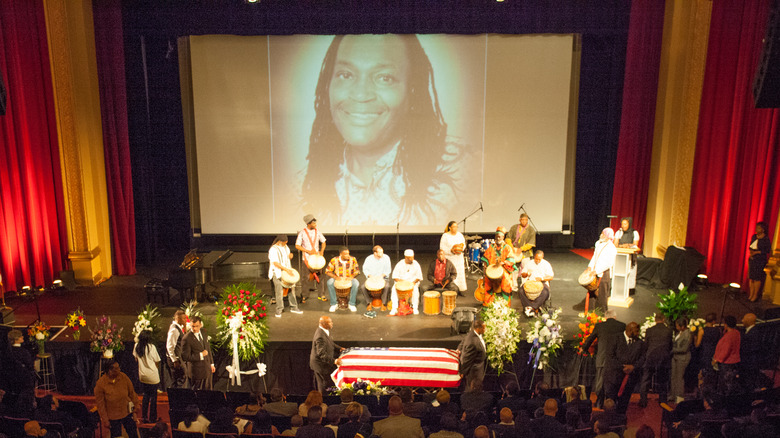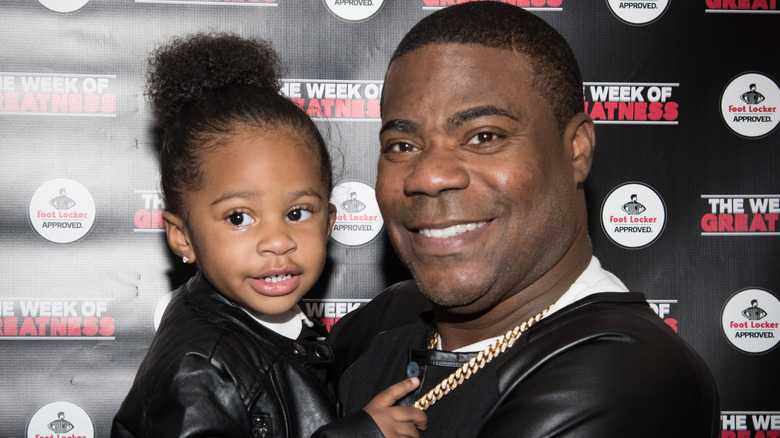The Tragic Real-Life Story Of Tracy Morgan
Tracy Morgan's career as an actor and a comedian has been the very definition of a roller coaster. Highs have been super high, and lows? They've been pretty low.
Morgan told GQ that one of his worst moments happened in November 2006. That, he explained, was when his invitation to Rockefeller Center's famous Christmas tree lighting was revoked in the aftermath of one of his arrests for driving under the influence of alcohol. That was not the kind of publicity he wanted and after he was uninvited, he said, "I cried all day. Coming from the projects of Brooklyn to lighting the tree. We watched it on TV, and it hurt me. I felt like I had let down all the cast members from '30 Rock.' I said, 'No more. I'm done.'"
When Morgan has made headlines, it's often for the sort of story that seems virtually indistinguishable from what's expected from his "30 Rock" alter ego, also named Tracy Jordan. But it was Lorne Michaels who explained the difference, saying, "No matter how mean you play Tracy, you sense the sweetness. It always comes through, which is why he can get away with the things he gets away with." Morgan's real-life story hasn't been an easy one, starting with his childhood in the Marlboro projects. Still, he's remained optimistic: "It's been up and down, and ugly. Sometimes, it's painful. But you take the good, you take the bad."
His father was deeply impacted by his tours in Vietnam
Tracy Morgan grew up a stone's throw from Coney Island. By the time he came along, his parents already had a son, who, according to GQ, was diagnosed with cerebral palsy early on. (Rolling Stone adds that he later contracted spinal meningitis and was paralyzed by it.) As for their father? He was haunted by the many tours he served after being drafted in the Vietnam War in 1965.
In his book, "I Am The New Black" (via Oprah), Morgan talked about growing up with a father who sometimes wandered the house at night, and how he'd realized that his father seemed to think he was still on patrol as a soldier in the Vietnam War. He wrote about never being sure if his father even knew where he was in those moments, saying, "I used to break down crying about that, even as a young kid, because I knew at those moments that I'd never have my dad. I could never have my father in his entirety because a huge part of him was never going to be there."
It wasn't until Tracy was in high school that his father, James Morgan, explained he had been a helicopter gunner and hadn't been able to count the number of people he'd killed. "Just like other survivors," Tracy wrote in his book. "He was torn to pieces inside by what he'd seen and what he'd had to do to survive."
If you or someone you know needs help with mental health, please contact the Crisis Text Line by texting HOME to 741741, call the National Alliance on Mental Illness helpline at 1-800-950-NAMI (6264), or visit the National Institute of Mental Health website.
Tracy Morgan's name carried some serious baggage
In "I Am The New Black" (via Oprah), Tracy Morgan explained exactly where his name came from, and it carried some serious weight.
When his father was first headed to Vietnam, he befriended another young soldier. They sat next to each other on the plane and during the flight, they got as close as soldiers could get, knowing — and fearing — what was waiting for them. Tracy's father, James Morgan, would recall sharing everything from the stories of where they'd come from and what they were leaving behind to what they wanted for their futures, not knowing what fate had in store for either one of them.
Tracy wrote, "They landed and got their assignments, and the next day my dad's new friend Tracy was dead. He was all in pieces because he stepped on a land mine. He was going home in a body bag after one day in the s**t." He recalled his father explaining, "That taught me everything I needed to know about the war. ... And that's how you got your name."
He was estranged from his mother because he wanted to know his father
Tracy Morgan sat down with The New Yorker in 2019, and one of the things he discussed was his new show, "The Last O.G." It was heavily inspired by his own life, starting with his parents.
They had grown up in the same Bedford-Stuyvesant housing complex in which they later raised their children. Until that is, his mother kicked his father out. After James Morgan returned from Vietnam, he became addicted to heroin, and Alice Morgan told her husband that it was time for him to leave after finding Tracy's older brother, Jim Jr., playing with a needle he'd found. James Morgan headed to the Bronx, and when Tracy was 13, he decided that he wanted to get to know his father.
So, he left home and, after spending a couple of indecisive days on the subway, knocked on his father's door. He spent the next two years living with his father and commuting hours to school. When the courts got involved to decide custody, he was old enough to tell them where he wanted to live. That was with his father, and he recalled that his mother "cried like I'd never seen her do before or since." What followed was a long-term estrangement from his mother, who stopped seeing or speaking to him. The guilt was still there, though, as he recalled, "Everything I've done in my career is because I wanted my mother's love."
Tracy Morgan's father died young
In his memoir, "I Am The New Black" (via The New York Post), Tracy Morgan shared that it was during one of those perfectly ordinary family arguments that he blurted out something that would haunt him for the rest of his life: He said that he wished his father was dead. It was the very same day, his father told him, "You got your wish."
His father had learned that he had tested HIV+, and would soon die from AIDS-related complications stemming from exposure to a dirty needle. Tracy was a senior in high school at the time and later told Rolling Stone, "We didn't know what AIDS was. I was a kid, unable to understand that my father was about to leave me. I didn't want to hear that s**t."
James Morgan died in 1987. But during an episode of "SuperSoul Sunday" filmed years later, Tracy would sit down with Oprah to tell her (via HuffPost) that it wasn't the last time he saw his father. When he was in a coma following a catastrophic and deadly multi-car accident, he said that he had spoken with him. "I just remember him saying, 'I'm not ready for you, son.' I started crying so hard. Probably harder than I cried at his funeral. I just kept saying, 'Dad.' He was my best friend in life."
He felt he had no choice but to deal drugs
In 2018, Tracy Morgan sat down with Conan O'Brien to talk about both "The Last O.G." and the parts of his life that it was loosely based on. At the time he was growing up, crack was the drug of choice, and selling it was a way to make some cash. Morgan explained, "I sold crack, yeah, but I was a crack dealer with a heart of gold. I would sell them crack, and then feel sorry for them. ... I'd say, 'You know this is going to kill you, right?'"
It may have been a tongue-in-cheek interview, but Morgan has spoken about that part of his life in a more serious way — and he's said that it's not something he's proud of. He's also added that he wasn't very good at it. In a Rolling Stone interview, he revealed that he would organize "meetings" with his clients — who would often pay him in pennies — and told them, "Listen, I'm tired of all your bulls**t. You've got to get your s**t together." It was at that time, too, that he had to supplement his income by getting a job at Wendy's. Still, it's not something he lightly brushes under the carpet. Morgan told NPR's Terry Gross: "It still bothers me today, but it's something that I did. It was survival."
Tracy Morgan turned to comedy after his best friend was murdered
It's no secret that many comedians make their careers by turning dark events into humor. In Tracy Morgan's case, the way to comedy involved the violent death of his best friend.
His name was Alan, and when asked about his time before comedy — and before "Saturday Night Live" was even a thought — Morgan said (via the Los Angeles Times), "[He was] my crack-dealing partner. He got murdered. Maybe, what, 19? I was 20, 21. We were selling crack. He went across the street; he and another guy got into it, got shot and killed him. That was common in our community."
It did more than make Morgan reevaluate his life choices, and he told WBUR that it was the same friend who had first told him that he should be in front of an audience doing comedy, not on the streets selling drugs. If his friend planted the seed, it was then-wife Sabina who nurtured it: Morgan told Rolling Stone that she was the one who pushed him to actually start doing stand-up. That was only the start, though, and it wasn't long before Morgan found that there was an internal battle that came with it: "I had my survival guilt when I started to achieve success. Why I made it out and some guys didn't."
Tracy Morgan felt like an outsider on SNL
While Tracy Morgan got his start in comedy clubs, he hit television screens in the Martin Lawrence sitcom "Martin." From there, it was on to "Saturday Night Live," but as he told Rolling Stone, it wasn't an easy transition — albeit one that let him and his family move to the residential neighborhood of Riverdale, buoyed by $9,000-per-episode paychecks. "I wasn't getting on any skits, and I didn't feel a part of the show," Morgan said. "I was basically the only Black dude there besides Tim Meadows."
What Morgan had always found audiences reacting to the most during his stand-up wasn't hitting with the "SNL" audience, but there was something else going on, too. While most of the cast and writers were living the single life, Morgan was going home to his wife and family — and all the responsibilities that went along with that. Things got so difficult that he had been seriously considering quitting when Lorne Michaels pulled him aside. "[Michaels] brought me back into his office one night at about four in the morning, and he said, 'Tracy, you're not here because you're Black. You're here because you're funny.'" Morgan says it was something that stuck with him even after he left. "I never forgot that," he says. "I'm here because I'm funny. Don't give up hope! You can make it. No matter how many mistakes you make, get up. Falling down is not a sin."
His diabetes diagnosis has led to extreme complications
Tracy Morgan was diagnosed with diabetes in 1996. According to Rolling Stone, his initial response to the diagnosis was to completely ignore everything about it — including doctors' recommendations to both manage the condition and work on maintaining a healthier lifestyle. And that meant that his health took a massive downward turn.
By 2007, he was spending days on-set, then going to the hospital at night, where he stayed to have his blood sugar monitored and controlled by IV drips. At the same time, he continued to drink — and after he found himself sentenced to wearing an ankle monitor that detected any alcohol in his system, things got even more dire. It was the monitor that caused an infection in his leg that nearly resulted in the amputation of his foot. That was his wake-up call. "I thought I was winning," he reflected at the time. "I didn't know I was losing."
Morgan started taking the condition — and his health — more seriously. But since then, he's had a slew of related complications. In 2010, he had a kidney transplant, and in 2012, the International Business Times reported that he had been rushed to the hospital after collapsing from a combination of exhaustion and altitude sickness. It was a lesson that could have turned deadly, but Morgan came out the other end with a respect for following medical advice.
Tracy Morgan's son convinced him to get sober
Tracy Morgan cut a pretty notorious figure at the nightclubs, and according to Rolling Stone, there would be a point in the night when it wasn't Morgan at all anymore — it was his alter ego, Chico Divine. "I love Chico," Morgan said of the over-the-top intoxicated version of his personality. "He is the coolest dude, he would never hurt anybody. Chico never shot at the cops. Chico never fought. The most Chico ever did was throw up in Club Suede."
Unfortunately, "Chico" also got behind the wheel of a car and left Morgan with several arrests for DUIs. After Morgan was sentenced to wear an ankle monitor in 2007, he told PBS (via CNN) three years later that getting sober had been incredibly hard. Especially, he said, when his son started asking him how he'd feel if he started following in his footsteps. "My son said, 'What if I start driving drunk and kill somebody?' That right there made me just look into the mirror, like, I got to step up my game."
Along with his son's grounding influence, Morgan also credited his father for teaching him how important it was to "learn from your mistakes." A year and a half later, he told People that he had been sober since, and while it meant he now felt everything, good and bad, he said that was ultimately a positive thing: "I want to feel it all because I've realized nothing lasts."
If you or anyone you know needs help with addiction issues, help is available. Visit the Substance Abuse and Mental Health Services Administration website or contact SAMHSA's National Helpline at 1-800-662-HELP (4357).
His marriage ended after more than two decades
After Tracy Morgan confronted his struggles with alcohol, he told People that his relationship with his sons had only strengthened, as it made them all realize they could talk to each other about anything. Unfortunately, not all of his relationships lasted through the ordeal, and he told Rolling Stone that one of his biggest regrets was the end of his 21-year-marriage.
Morgan and his wife, Sabina, split in 2001 and divorced in 2009. A decade later, Entertainment Weekly quoted Morgan as paying a heartbreaking tribute to her when he spoke at the ESPYS awards show. He shared that he was certain that he was still alive because he had work to do before he passed on. He also said, "My ex-wife passed away from cancer three years ago, so when I go on that stage, that will be for my ex-wife. That will be for my kids. That will be for your family members. That will be for everyone who passed away from cancer."
Two years after divorcing his first wife, Morgan was set up on a blind date with Megan Wollover. Although he told People that he knew it was love at first sight and that he was going to marry her — and he did, in 2015 — Wollover filed for divorce in 2020, alongside issuing a public statement asking for privacy.
A tragic accident claimed the life of his good friend
On June 7, 2014, The New York Times reported on a horrifying accident: Tracy Morgan was on his way home after performing a stand-up gig in Delaware when a tractor-trailer hit the van he and his friends were in. The resulting multi-car crash left him critically injured, and one of his lifelong friends — James McNair — was pronounced dead by the first responders who arrived on the scene.
At the time of the announcement, details were scarce. The accident, it was reported, had been caused when the driver failed to notice that traffic ahead of him had slowed. The truck had belonged to Walmart, who immediately issued a statement that they would take responsibility should it be determined to be the fault of their driver. The following day, driver Kevin Roper was charged with four counts of assault by auto, and one count of death by auto (via CNN). In 2015, USA Today reported that Walmart had settled a wrongful death suit filed by McNair's family. At the time, the criminal charges against Roper and Morgan's lawsuit against Walmart had yet to be settled.
The New Yorker would ultimately report that Morgan had been awarded enough money from the settlement that he could comfortably retire, but he didn't. In 2015, he appeared on Today, saying, "Bones heal. The loss of my friend will never heal."
Recovery from the accident wasn't easy
The injuries that Tracy Morgan suffered in the 2014 collision with a Walmart truck were catastrophic. Rolling Stone reported that he had broken every bone in his face, along with his ribs and his leg. It was the head injury that was the worst, though, and after being in a coma for eight days, he woke up blind. That lasted six days, and even then, there were doubts as to whether or not he would ever walk again, much less get back on stage. The road to recovery was a long and difficult one: "I thought I was going to die for a long time," he told Rolling Stone. "My thoughts — I was in a very dark place. I was sitting right here, contemplating suicide."
Morgan has been incredibly candid about his struggles, and not just the physical ones. (Those, he said in his first post-accident interview on Today, included things like memory loss, headaches, and nose bleeds even a year later.) He spoke about the guilt, too — wondering why he had survived and James McNair hadn't, wondering why he had chosen that trip not to have his family accompany him as they usually did, haunted by thoughts of what would have happened to his then-10-month-old daughter.
If you or anyone you know is having suicidal thoughts, please call the National Suicide Prevention Lifeline by dialing 988 or by calling 1-800-273-TALK (8255).
